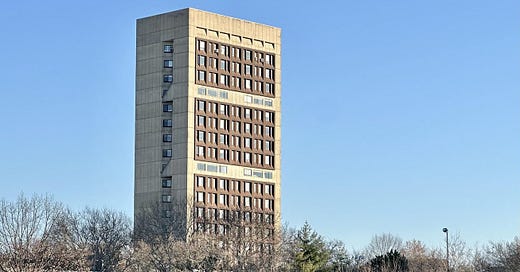Anti-Influencer Action
My simple proposal: An AI to preemptively identify 'Harvard influencers' and place them in Mather House as a deterrent in the name of public safety.
I love Mather House. I really do. On my first day at Harvard, I drove into Cambridge from the east, and stopped at the JFK intersection. Through the trees, past the beautiful neo-Georgian towers of Lowell and Dunster, I could see a huge concrete tower looming in the distance.
“Oh my God,” I said out loud, to myself, at the intersection. “It’s even uglier than in the pictures.”
Unrelatedly, last week the Crimson published a deep-dive into the world of Harvard influencers — the Twitch livestreamers, the Instagram beauty gurus, the YouTubers, the TikTokers. (It’s mostly the TikTokers.) The article didn’t contain much information that a plugged-in student wouldn’t already know: In our midst walk hyper-online, mildly self-absorbed social media stars, who have built brands — and made bank — documenting their lives for international consumption. I kind of respect the Harvard influencers. They’ve just monetized what we already understand — namely, that social media has a Harvard fetish, and that a reasonably attractive person with Internet chops can make bank off it.
The Pulitzers might have to invent a new category for Kaufman and Lippit’s work, though — the duo coaxed the influencers into self-incriminating by sharing their sky-high incomes, five-figure brand deals, ring lights, and college counseling businesses. They share their ostensibly altruistic motives: to “humanize Harvard,” or else to “dismantle the stigma around youth-led nonprofits” (challenge level: impossible). The influencers all hate one another for obscure and niche stylistic reasons. The lifestyle influencers, who vlog their day-to-day academic lives, hate the college-admissions influencers; the gamers have “got some ops”; everyone has debilitating anxiety and thinks all their classmates know their names.
Luckily, this is the internet — so anything that annoys me personally is indicative of a diseased society. Have I ever got a vaccine for you: Mather House.
It is internationally recognized that one simply cannot be ‘cool’ or ‘aesthetic’ in Mather. The distinctive cinderblock walls and menacing interior are so socially ruinous that no one is proud to show it in their end-of-year Instagram photo roundup, let alone a daily ‘get ready with me as a Harvard student.’ I believe wholeheartedly that a student will never make a career as an influencer while living in Mather.
Much has been made lately of ‘AI’ and its applicability to the classroom. AI fears have forced me to take bona-fide blue book sit-down exams, and lavish grant programs have ruined my gem Geneds. But I believe I have found the one perfect use-case for artificial intelligence: identifying prospective Harvard influencers in the pre-frosh class before they even consider downloading TikTok — and placing them in Mather House as a preventitive measure, completely blocking them from a visually appealing, easily monetizeable life.
If the program shows promise (which I would quantify as a thirty percent or greater year-over-year reduction in Harvard Influencers), I suggest that the same principle be applied to other groups, like ‘electric scooter riders’ and ‘guys who wear a suit to econ lectures.’ We cannot rest until the social undesirables of the College are confined in our local Soviet prison.





